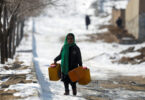KABUL (The Hill): The Taliban’s swift takeover of Afghanistan has set off a chain reaction of chaos just two weeks before the US was set to officially withdraw the last of its troops in the country. The fall of Kabul on Sunday came after a week of lightning-fast territorial gains and crumbling government forces that could not hold off the Islamist militant group that ruled Afghanistan before the arrival of American forces in 2001.
Americans, as well as Afghan civilians who worked with the US government, are now scrambling to get out of the country. While President Biden is standing by his decision to withdraw US troops, he acknowledged Monday that the situation “did unfold more quickly than we’d anticipated.” Here are the five takeaways from the collapse of the Afghan government and Taliban takeover.
The scene at Kabul’s international airport descended into chaos Monday as military and civilian flights stalled on the tarmac when thousands of Afghan civilians flooded the runway in desperate search of a way out. Photos and videos show people surrounding planes, with dozens of them clinging to a US C-17 transport aircraft or running beside it as it tried to take off. In another video, several Afghans were seen falling off the plane as it left the runway. The surge of panicked civilians grew so quickly that the US military, in the midst of evacuating American personnel, had to halt flights for several hours.
The scene also prompted the Pentagon to send thousands more US troops to the country to help secure the airport, bumping the US military presence from 1,000 to 6,000 in a matter of days to support the evacuation. At the US Embassy in Kabul, all American personnel were evacuated, leaving unguarded a building that cost the United States nearly $800 million to construct, according to the State Department. Elsewhere in the capital, Taliban fighters went door to door looking for any men who served in the Afghan special forces or helped the US military, Fox News reported.
The Taliban has said it would not interfere with US evacuation efforts, but that’s just one of many hurdles to getting tens of thousands of Afghan civilians out of the country. The US has pledged to assist more than 80,000 people who qualify for special immigrant visas meant to help Afghans, and their family members, who worked with the US government. Some experts say that is unrealistic. “The idea that visa processing can provide protection as the country is crumbling and is now in the hands of the Taliban ignores the grim reality on the ground,” said Krish O’Mara Vignarajah, president of Lutheran Immigration and Refugee Service, which will help resettle Afghan evacuees.
The United States had long touted gains made in women’s rights in Afghanistan as one of the main accomplishments in the country over the past two decades. But the Taliban takeover means women and girls are once again at risk of losing their freedoms. From 1996 to 2001, when the Taliban controlled the country and ruled with an extreme interpretation of Islamic law, women and girls were prohibited from attending school, working or leaving their homes unless accompanied by a man. Women were also prohibited from driving and required to cover most of their body, including their face.
Those who broke the rules were sometimes subjected to humiliation and public beatings. On Monday, CNN’s Clarissa Ward reported that of the women she saw outside their homes in Kabul, many were dressed more conservatively than they were just a week ago. Taliban leaders, during failed peace talks over the last several years, have assured Western officials that women would be given equal rights as granted by Islam, though many, including numerous US lawmakers, have expressed serious doubts.
“There must be an immediate expansion of the refugee program for Afghan women seeking asylum, whose lives are in jeopardy as the Taliban resumes control and turns back the clock on 20 years of progress for women’s rights. A failure to act now will seal their fate, and the generation of girls who grew up with freedoms, education and dreams of building their country’s future will die with them,” Sen. Jeanne Shaheen (D-N.H.), said in a statement Monday. In the Pentagon’s press briefing room on Monday afternoon, a female Afghan journalist became emotional over the Taliban takeover of her country and the fate of women and girls there.
“I’m very upset today because Afghan women didn’t expect that overnight all the Taliban [would come],” she said. “They took off my flag. … Everybody is upset, especially women.” While the United States continues to pull out of Afghanistan, China and Russia appear ready to move in, signaling an openness to working with the Taliban. Zamir Kabulov, Moscow’s representative in Kabul, said Russia would not evacuate its embassy in Kabul and would “stay in contact” with Taliban officials in Doha “to work out a permanent mechanism of ensuring safety of our embassy.”
China, meanwhile, which met with Taliban leaders last month in Beijing, called for a “smooth transition” in Afghanistan. The country also said it is willing to seek “good-neighborliness and friendly cooperation” with the Taliban, signaling it may recognize them as a legitimate government. It remains unclear how China’s and Russia’s approaches to Afghanistan could either hamper or bolster US efforts in the region. Biden on Monday said Beijing and Moscow “would love nothing more than for the United States to continue to funnel billions of dollars in resources and attention into stabilizing Afghanistan indefinitely.” The Pentagon is already warning that terrorist groups based in Afghanistan could regain footholds more quickly than expected with the Taliban back in control.
Defense Secretary Lloyd Austin wants to look at whether groups such as al Qaeda and the Islamic State will be able to strengthen after 20 years of being on the run, Pentagon press secretary John Kirby said Monday. “The secretary certainly believes that in light of recent events that a reassessment of the possibilities for reconstitution of terrorist networks inside Afghanistan is warranted,” Kirby said. But he added that “we’re in no position at this point just one day after the events in Kabul to make a firm judgment either way or what that’s going to look like” and that it’s “way too early to make assessments and judgments about what the counterterrorism threat” is going to be.
Members of al Qaeda who participated in the 9/11 attacks had trained in Afghanistan, making the country a primary target after the terrorist attacks were carried out. Last week, thousands of Taliban, al Qaeda and ISIS prisoners were reportedly released from Bagram air base after the Taliban took over the hub of the US war effort. Lawmakers have been dubious of the Biden administration’s ability to keep terrorists at bay without US troops in the country. Senate Minority Leader Mitch McConnell (R-Ky.) said recently it “would be very very difficult” for Washington to do exactly that.






